Leyland, Lancashire
Leyland (/ˈleɪlənd/ LAY-lənd) is a town in South Ribble, Lancashire, England, 6 miles (10 km) south of Preston. The population was 35,578 at the 2011 Census.[2]
| Leyland | |
|---|---|
| Town | |
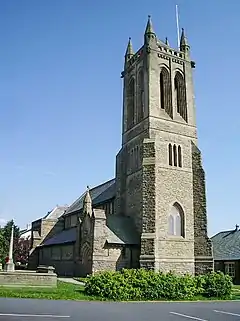 Church of St Ambrose | |
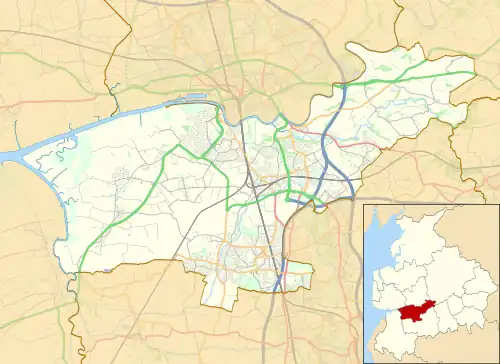 Leyland Shown within South Ribble  Leyland Location within Lancashire | |
| Population | 38,578 [1] (2001 census) |
| OS grid reference | SD549232 |
| District | |
| Shire county | |
| Region | |
| Country | England |
| Sovereign state | United Kingdom |
| Post town | LEYLAND |
| Postcode district | PR25, PR26 |
| Dialling code | 01772 |
| Police | Lancashire |
| Fire | Lancashire |
| Ambulance | North West |
| UK Parliament | |
The name of the town is Anglo-Saxon, meaning "untilled land".
History
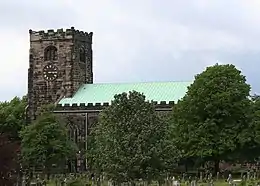
Leyland was an area of fields, with Roman roads passing through, from ancient Wigan to Walton-le-Dale.
It was left undisturbed for many centuries until rediscovered shortly after the Battle of Hastings (1066). Leyland is mentioned in the Domesday Book (1085). In 1066, King Edward the Confessor presided over the whole of Leyland. The manor was divided into three large ploughlands, which were controlled by local noblemen. In the 12th century, it came under the barony of Penwortham.
The area of Worden, which is now Worden Park, was one of nine oxgangs of land granted to the Knights Hospitaller, by Roger de Lacy, in Lancashire, but the land was not assigned to any individual and a local man, who was a very close friend of de Lacy, Hugh Bussel, was assigned holder of the land in 1212.
Notable features that remain include the St Andrew's Parish Church, built around 1200 AD, and the large stone Leyland Cross, thought to date back to Saxon times.
Industry and commerce
The town is famous primarily for the bus and truck manufacturer Leyland Motors, which between the 1950s and 1970s expanded and grew to own several British motor manufacturers, including British Motor Corporation, Standard-Triumph and Rover, culminating in the massive British Leyland company. The truck business still operates today as Leyland Trucks, and is owned by Paccar.
Leyland is also home to one of the leading maintenance and utility companies in the United Kingdom, Enterprise plc on Centurion Way.
The town has been home to Dr Oetkers pizza factory on Marathon Place, Moss Side, since 1989.[3]
Governance
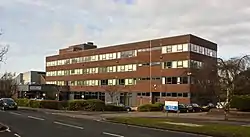
There are two tiers of local government covering Leyland, at district and county level: South Ribble Borough Council and Lancashire County Council. The borough council is based in Leyland, at the Civic Centre on West Paddock.[4]
Leyland was an ancient parish. In 1863 the parish was made a local government district, governed by a local board.[5] Such local government districts were reconstituted as urban districts in 1894.[6][7] Leyland Urban District was abolished in 1974 to become part of the new borough of South Ribble. No successor parish was created for the former urban district, and so it became an unparished area.[8] Shortly before its abolition, the urban district council had built itself a new headquarters on West Paddock, which subsequently became the South Ribble Civic Centre.
Transport
Leyland railway station is on the West Coast Main Line and is operated by Northern. There is one train an hour between Liverpool Lime Street and Preston. There is also one train an hour between Manchester Victoria/Hazel Grove to Blackpool North.
There is a marker adjacent to the old Leyland Motors Spurrier works at the halfway point on the railway journey between Glasgow and London, some 198 miles in either direction. John Fishwick & Sons which served the town's public transport needs, and connected the town to Chorley and Preston, ceased trading in 2015 and Stagecoach Merseyside & South Lancashire took over the route.[9]
Education
High schools
High schools in Leyland include Balshaw's CE High School near Leyland Cross, St Mary's Catholic High School, Worden Academy, a smaller high school situated to the west of the town and Wellfield Academy near the town centre.[10]
Colleges
To the east of Worden Park is Runshaw College.
Architecture
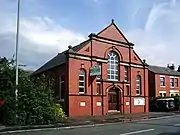
Since July 2007, the former Primitive Methodist Church on Leyland Lane has been home to the Greek Orthodox Church of the Holy Apostles.[11]
Most of the housing in Leyland falls under the semi-detached, detached and bungalow categories. There are a few modern housing estates, but about 65% of the accommodation in the town was built in the 1970s.
Areas
Leyland is made up by six different areas, the town centre itself counts as the main retail side, with the railway station, library and shops nearby. The other areas include Broadfield, Moss Side, Worden Park, Turpin Green and the Wade Hall estate.
Geography
People
Notable people who have grown up or lived in Leyland include:
- Tom Bidwell, screen writer, Oscar nominated, BAFTA and EMI winner
- Fred Beardsworth, footballer
- William Bennett, 1920s footballer
- Clarke Carlisle, footballer, was educated at Balshaw's CE High School
- Liv Cooke, football freestyler
- Allen Hill, played in the first ever cricket Test
- Tim Farron, Leader of the Liberal Democrats 2015–2017, attended Runshaw College as a teenager.[12]
- Phil Jones, footballer
- Frank Moss, football manager and former player, known for his six-year contract with Arsenal
- Danny Mayor, footballer
- Brian Pilkington, footballer
- Mike Salmon, retired goalkeeper, who currently works as a football manager
- Kevin Simm, Liberty X singer grew up in the area and attended St Anne's Primary School and St Mary's High School
- Chris Tuson, rugby league player
- John Woodcock, executed by the Stuarts in 1646 for his Catholicism
Gallery
 Leyland Cross
Leyland Cross.jpg.webp) Old Police Station
Old Police Station South Ribble Museum
South Ribble Museum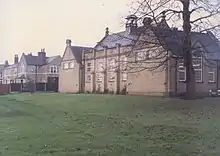 Balshaw's Grammar School
Balshaw's Grammar School Eagle and Child pub
Eagle and Child pub
References
- Population of 35,578 is the sum of the following ward populations: Moss Side Archived 3 March 2016 at the Wayback Machine 3673; Earnshaw Bridge Archived 4 March 2016 at the Wayback Machine 3722; Golden Hill Archived 4 March 2016 at the Wayback Machine 3982; Seven Stars Archived 4 March 2016 at the Wayback Machine 3701; Lowerhouse Archived 4 March 2016 at the Wayback Machine 4050; Leyland St. Mary's Archived 3 March 2016 at the Wayback Machine 3562; Leyland Central Archived 4 March 2016 at the Wayback Machine 3626; Leyland St. Ambrose Archived 3 March 2016 at the Wayback Machine 3337; Leyland St. John's Archived 4 March 2016 at the Wayback Machine 5925. All accessed 30 September 2011.
- "Leyland Central – UK Census Data 2011". Archived from the original on 24 October 2018. Retrieved 24 October 2018.
- "Pizza factory planning to super-size in Leyland to grab a bigger slice of the market". 9 January 2020. Archived from the original on 30 June 2022. Retrieved 22 May 2022.
- "Contact us". South Ribble Borough Council. Retrieved 25 August 2022.
Civic Centre, West Paddock, Leyland, Lancashire, PR25 1DH
- Kelly's Directory of Lancashire. London. 1905. p. 593.
{{cite book}}: CS1 maint: location missing publisher (link) - Local Government Act 1894
- "Leyland Ancient Parish / Civil Parish". A Vision of Britain through Time. GB Historical GIS / University of Portsmouth. Retrieved 18 October 2023.
- Local Government Act 1972
- "John Fishwick & Sons". Fishwicks. Archived from the original on 24 April 2015. Retrieved 25 October 2015.
- "GCSE success for Leyland students". Archived from the original on 10 September 2010. Retrieved 21 September 2010.
- "Orthodox Church of the Holy Apostles". holy-apostles.org.uk. Archived from the original on 2 March 2020. Retrieved 2 March 2020.
- Prince, Rosa (16 July 2015). "Tim Farron: the Christian Lefty on course to be elected Liberal Democrat leader". The Daily Telegraph. London. Archived from the original on 13 April 2018. Retrieved 5 April 2018.
- BBC Online (2006a) Schools in Lancashire, Education\League Tables, 19 January 2006 [accessed 27 June 2007]
- BBC Online (2006b) Institutions in Lancashire, Education\League Tables, 19 January 2006 [accessed 4 May 2007]
- Hunt, D., (1990), The History of Leyland and District, Carnegie Press, ISBN 0-948789-48-4
- Hunt, D. and Waring, W. (1995), The Archive Photograph Series: Leyland, Chalford Publishing Company, ISBN 0-7524-0348-6
- Smith, J., (2003), Then and Now: Leyland, Tempus Publishing, ISBN 0-7524-2672-9
- South Ribble Borough Council – Leyland Town Centre Masterplan [accessed 23 April 2008]